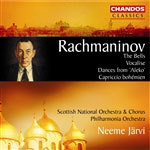
The Bells / Vocalise / Dances from 'Aleko' / Capriccio bohemien
 $26.00
Out of Stock
$26.00
Out of Stock6+ weeks add to cart
RACHMANINOV
The Bells / Vocalise / Dances from 'Aleko' / Capriccio bohemien
Suzanne Murphy (soprano) Keith Lewis (tenor) David Wilson-Johnson (baritone) / Royal Scottish National Orchestra / Philharmonia Orchestra Neeme Jarvi
[ Chandos Classics / CD ]
Release Date: Tuesday 12 July 2005
This item is currently out of stock. It may take 6 or more weeks to obtain from when you place your order as this is a specialist product.
Rachmaninov, one of the twentieth-century's most enduringly popular composers, is represented here with acclaimed performances of some of his greatest compositions.
His characteristic command of emotional gesture, the broad sweep of his melodic lines and forms, and loyalty to the finer points of Russian romanticism inherited from Tchaikovsky, are all very much in evidence in the music on this disc which includes The Bells, a magnificent choral symphony which Rachmaninov believed to be his finest work, and the hauntingly beautiful Vocalise, one of the most requested pieces of music of all time.
Neeme Järvi has an enormous catalogue on the Chandos label and is particularly renowned for his interpretations of Russian music.
This newly compiled recording is available at mid-price.
…If I have been at all successful in making the bells vibrate with human emotion in my works, it is largely due to the fact that most of my life was lived amid the vibrations of the bells of Moscow… In the drowsy quiet of a Roman afternoon, with Poe's verses before me, I heard the bells' voices, and tried to set down on paper their lovely tones that seemed to express the varying shades of human experience.
Thus, in his memoirs, did Rachmaninov establish the significance for him of the sound of bells. The idea for a work based on Edgar Allan Poe's The Bells was suggested by a young cellist, a pupil of a friend, who had come across and been wildly excited by the poem. Rachmaninov asked Konstantin Balmont to furnish him with a Russian version of the work, and though it turned out to be more of an adaptation than a literal translation, its basic properties were retained in its evocation of the life-cycle of birth, marriage, terror and death.These in their turn were related to different sorts of bells: silver, golden, brass and iron. Rachmaninov considered its premiere in St Petersburg as one of the crowning moments of his career.
Rachmaninov's collection of songs, Op. 34, are generally recognised as his finest achievement in this field. They were written for a variety of singers, but No. 14, Vocalise, was custom built for the coloratura soprano Antonina Nezhdanova. Such was the appeal and haunting beauty of this wordless song that Rachmaninov transcribed it for small orchestra, where it gained even greater popularity.
In his Capriccio bohémien, Rachmaninov was clearly fired to compose in the same exotic genre that Tchaikovsky and Rimsky-Korsakov had cultivated in their own popular Italian and Spanish Capriccios. The result is a colourful and lively dance rhapsody that is an early example of Rachmaninov's mastery of the large orchestra.